
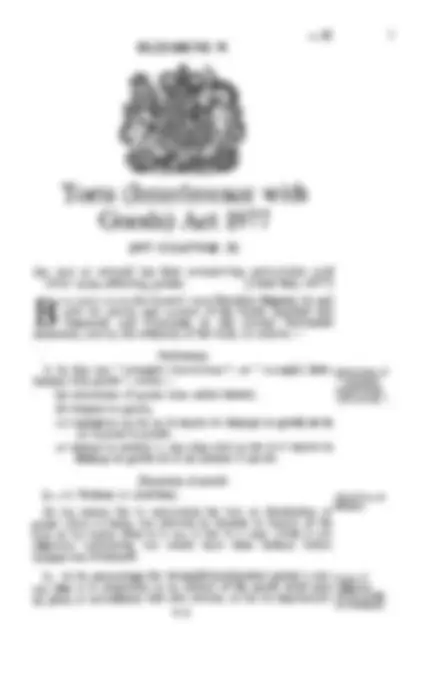
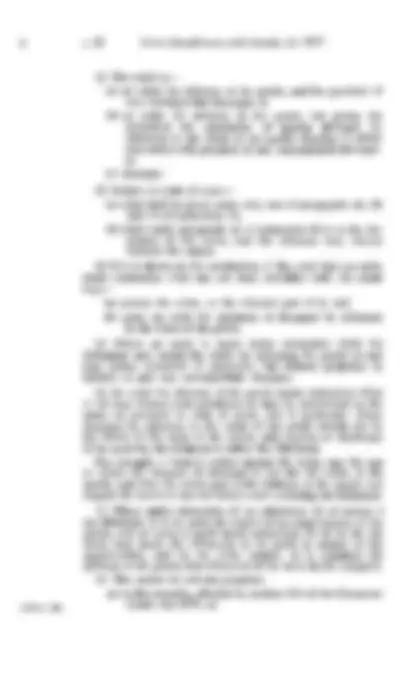
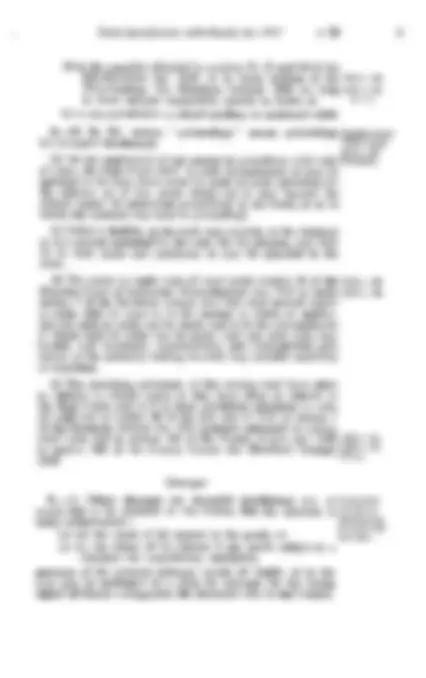
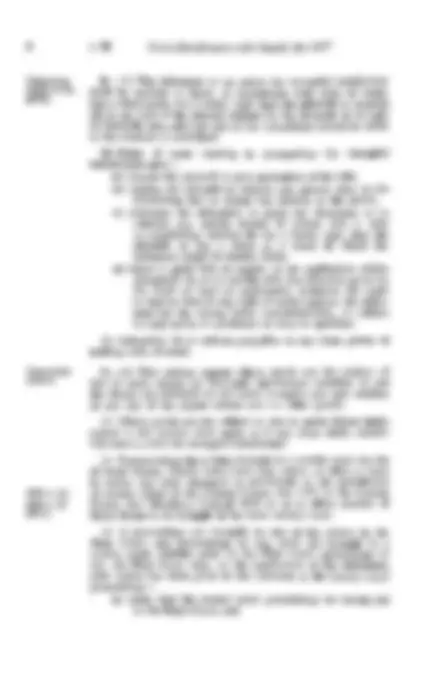
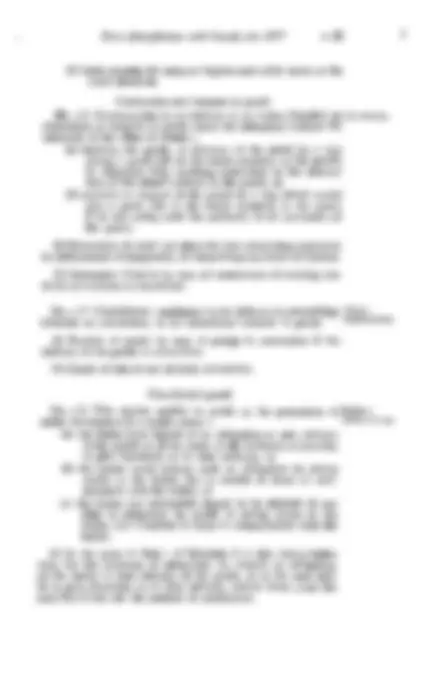
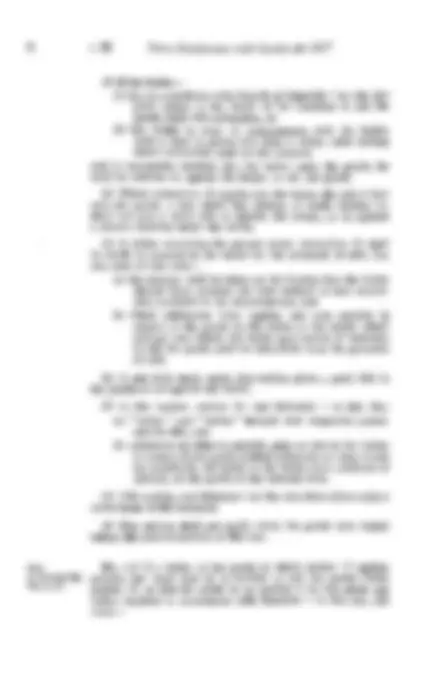
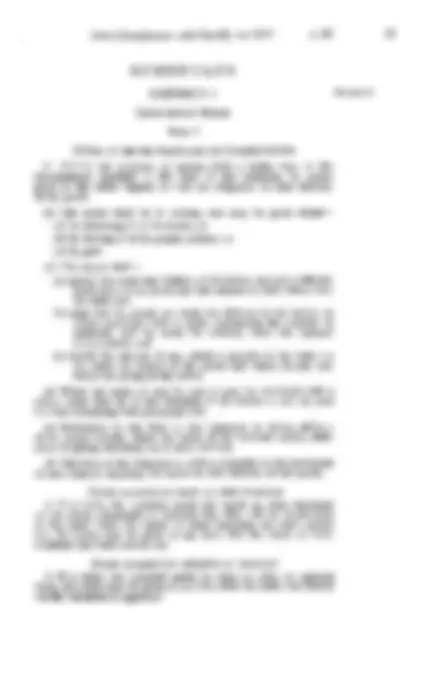
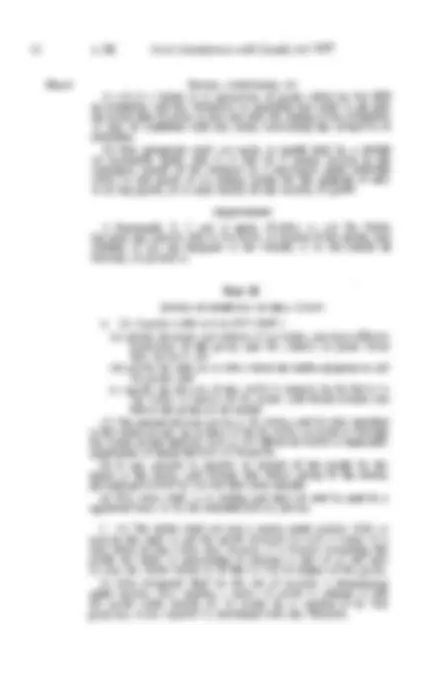
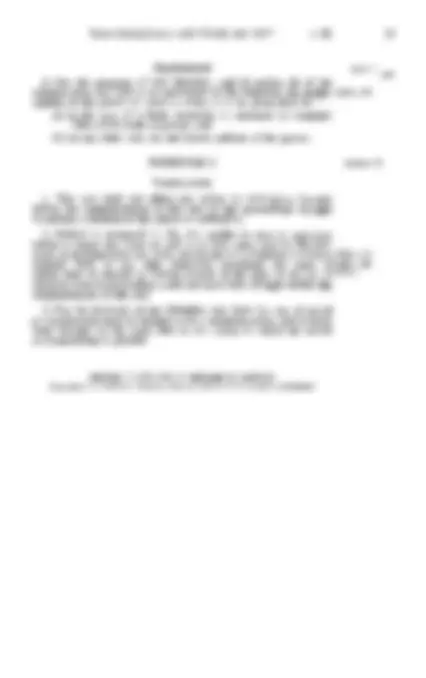


Study with the several resources on Docsity

Earn points by helping other students or get them with a premium plan


Prepare for your exams
Study with the several resources on Docsity

Earn points to download
Earn points by helping other students or get them with a premium plan
Community
Ask the community for help and clear up your study doubts
Discover the best universities in your country according to Docsity users
Free resources
Download our free guides on studying techniques, anxiety management strategies, and thesis advice from Docsity tutors
The Torts (Interference with Goods) Act 1977, focusing on sections related to detention of goods and damages for wrongful interference. The Act defines 'wrongful interference with goods', including conversion, trespass to goods, and negligence causing damage. Detention of goods by a bailee in breach of duty results in relief for the bailor, including an order for delivery and payment of damages. The document also covers the remedies afforded by the Hire-Purchase Act 1965 and rules of court for proceedings for wrongful interference.
What you will learn
Typology: Study notes
1 / 16

This page cannot be seen from the preview
Don't miss anything!










Goods) Act^1977
ARRANGEMENT OF SECTIONS
Preliminary Section
Damages
Conversion and trespass to^ goods
Uncollectedgoods
Supplemental Section
SCHEDULES: Schedule 1-Uncollected^ goods.
2
1974 c. 39.
c. 32 Torts(Interference with Goods) Act 1977
(2) The relief (^) is- (a) an order for (^) delivery of the goods, and for payment of any consequential (^) damages, or
defendant the alternative of (^) paying damages by reference to the (^) value of the goods, together in either alternativewithpayment ofany consequentialdamages, or (c) damages.
may-
liability to pay any consequential damages.
the whole^ of^ the^ value^ of^ the^ goods,^ may^ require^ an^ allowance
court may assess the allowance to be made (^) in respect of the
Torts (Interferencewith Goods) Act 1977 c. 32 3
for wrongful interference. reliefwhere goods are (2) On theapplication of any person (^) inaccordance withrulesdetained.
whichany question (^) may arisein proceedings.
or to a person appointed (^) by the court for the purpose,and shall
order.
(4) The powerto makerules of court under section 99 of the (^1925) c. 49.
include such incidental, supplementary and consequential pro-
Damages
reduction for contributory negligence,
Torts (Interferencewith Goods) Act^1977 c.^32
in good faith, (^) subsection (3) below will ordinarily make a^ com-
a purported bailment^ or^ other^ dispositionof^ goods^ as^ it^ applies to a purported sale^ of^ goods.
liability of the wrongdoer which can arise-^ liability.
includes the entire^ value^ of^ the^ goods,^ although^ the
wrongdoer as^ between^ thoseclaimants.
liability.
any claimant is^ unjustly^ enriched^ to^ any^ extent,^ he^ shall^ be
goods.
6 c. 32 Torts (^) (Interference with Goods) Act 1977
Competing rights to the goods.
shall be (^) entitled to show, in (^) accordance with rules of court,
ofwhich^ he sues, and any (^) rule of law(sometimes called justertii) tothe contrary is abolished.
(a) require the plaintiff to giveparticulars of his title, (b) require the plaintiff (^) to identify any person who, to his knowledge, has or (^) claims any interest in the goods,
whether any person should be joined with a view to establishing whether he has a better right than the plaintiff, or has a claim as a result of which the defendant might be doubly liable, (d) where a party fails to appear on an application within paragraph (c), or to complywith anydirection given by the court on such an application, authorise the court to deprive him of any right of action against the defen-
to such terms or conditions as may be specified.
(3) Subsection (2) is without prejudice to any other power of makingrules of court.
the (^) claims are founded on the same wrongful act, and whether or not any of^ the^ claims relates^ also^ to^ other^ goods). (2) Where goods are the subject of two^ or more claims^ under
6(3) were a claim forwrongful interference.
(3) Ifproceedings havebeen brought ina^ county^ court^ on^ one of those claims, county court^ rules^ may^ waive,^ or^ allow^ a^ court
county court, whether prior to the High Court proceedings or not, the High Court may, on the application of the defendant, after notice has been given to the claimant in the (^) county court proceedings- (a) order that^ the county court proceedings be transferred to the High^ Court, and
8 c. 32 Torts(Interferencewith Goods) Act 1977
(a) (^) has in accordance with Part IIof (^) Schedule 1 to this Act given notice (^) to the bailor of his intention to sell the goodsunder this subsection,or (b) has failed (^) to trace or communicate with the bailor with a view (^) to giving him such a notice, after having
and is reasonably satisfied (^) that the bailor owns the goods, he shall be entitled, as against (^) the bailor, to sell the goods.
(4) Where subsection (3) applies (^) but the bailor did not in fact own the goods, a sale under (^) this section, or under section 13, shall not give a good title as against (^) the owner, or as against a person claiming under the owner.
be liable to account to the bailor for the proceeds of sale, less
(a) the account shall be takenon the footing thatthe bailee should have adopted the best method of sale reason- ably available in the circumstances, and (b) where^ subsection^ (3)(a) applies, any^ sum payable^ in respect of the goods by the bailor to the bailee which accrued due before the bailee gave notice of intention to sell the goods shall be deductible from the proceeds of sale.
the purchaser as against the bailor.
sors intitle, and (b) references to what is payable, paid or due to the bailee in respect of the goodsinclude references to whatwould be payableby the bailorto the bailee as^ a condition of delivery of the goods at^ the relevant time.
(8) This section, and Schedule 1 tothis Act, have effect subject tothetermsofthe bailment.
(9) This section shall not^ apply^ where^ the^ goods^ were^ bailed beforethe commencementof^ this^ Act.
authorised by^ satisfies the court that he is entitled to sell the (^) goods under
notice required in accordance with Schedule 1 to^ this^ Act, the
Torts (Interferencewith Goods)^ Act^1977 c.^32
(a) may authorise (^) the sale of the goods subject to^ such
section shall, subject to any right of appeal, be conclusive, as against (^) the bailor, of the bailee's (^) entitlement to sell the goods,
Supplemental
Northern Ireland the current amount mentioned in
Ireland) 1959, (N.I.).
of the Parliament of Northern Ireland or an (^) Order in Council (^) made under the Northern Ireland (Temporary 1972c. 22.
Ireland Assembly,
action and (^) money,
NorthernIreland.
ences to that enactment (^) as amended, extended or applied by or under that or (^) any other enactment.
hereby repealed. (^1952) c. 43.
bailed before^ thecommencementof^ this^ Act.
person with whom (^) the goods are deposited where the notice of
of 1952 was^ delivered^ before^ the^ commencementof^ this^ Act.
Torts (Interferencewith Goods)^ Act^1977 c.^32
SCHEDULES
SCHEDULE 1
UNCOLLECTED GOODS
POWER TO IMPOSE OBLIGATION TO COLLECT GOODS
circumstances specified in this Part of this Schedule, by notice given to the bailor impose on him an obligation to take delivery of the goods.
(c) by post.
(a) specify the^ name^ and^ address^ ofthe^ bailee, and^ give^ sufficient particulars of the goods and the address or place where they are held, and (b) (^) state that the goods are ready for delivery to the bailor, or where combined with a notice terminating the contract of bailment, will be ready for delivery when the contract is terminated, and
the bailee in respect of the goods and which became^ due before the givingof the notice.
in a waycomplyingwith paragraph 6(4).
(5) References in this Part of this^ Schedule to^ taking^ delivery of the goods include, where the terms^ of^ the^ bailment^ admit,^ refer- ences to giving directions as to their delivery. (6) This Partof this Scheduleis^ withoutprejudice^ tothe^ provisions of any contract requiring^ the^ bailor^ to^ take^ delivery^ of^ the^ goods.
Goods accepted forrepair or other treatment
Goods accepted for valuation or^ appraisal
them,thenotice may be given at anytime^ afterthebailee^ has^ carried out the valuationorappraisal.
Section 12.
11
12 c.^32 Torts (Interferencewith Goods) Act^1977
SCII. 1 Storage, warehousing, etc.
as custodian, and his obligation as custodian has come to^ an^ end, thenotice may be given atanytime afterthe endingof theobligation, or may be combined with any notice terminating his obligation as custodian. (2) This paragraph shall not apply to goods held by a^ person as mercantile agent, that is to say by a person having in^ the customary course of his^ business as a mercantile agent^ authority either to sell goods or to consign goods for the purpose of sale, or to buy goods, orto raise money on the security of goods.
Supplemental
NOTICE OF INTENTION TO SELL GOODS
(a) specify the name and address^ of the^ bailee,^ andgive sufficient particulars of the goods^ and^ the^ address^ or^ place^ where- they are held,^ and (b) specify the date on or after which the bailee proposes to sell the goods, and (c) specify the^ amount,^ if^ any,^ which^ is^ payable^ by^ the^ bailor^ to the bailee in respect of the goods, and which became due before the giving^ of^ the^ notice. (2) The period between giving^ of^ the^ notice^ and^ the^ date^ specified in the notice as that on or after^ which^ thebaileeproposes^ to^ exercise
opportunity oftaking deliveryof^ the^ goods. (3) If^ any^ amount^ is^ payable^ in^ respect^ of^ the^ goods^ by^ the bailor to the^ bailee,^ and^ became^ due^ before^ giving^ of^ the^ notice, the said period^ shall^ be^ notless^ than^ three^ months. (4) The notice shall be in writing and shall be sent by post in a registered letter, orbythe recorded deliveryservice.
exercise his right^ to^ sell^ the^ goods^ pursuant^ to^ such^ a^ notice,^ at^ a time when he has^ notice^ that,^ because^ of^ a^ dispute^ concerning^ the goods, the bailor is questioning or refusing to pay all or any part of (^) what the bailee claims to be due to him in respect of the goods. (2) This^ paragraph^ shall^ be^ left^ out^ of^ account^ in^ determining under section 13(1) whether a^ bailee^ of^ goods^ is^ entitled^ to sell the goods under section 12, or would be^ so^ entitled^ if he had given any notice^ required^ in^ accordance^ with^ this^ Schedule.
c. (^32) Torts(Interferencewith Goods) Act 1977
LONDON: PUBLISHED BY HER MAJESTY'S STATIONERY OFFICE 35p net ISBN 0 10 543277 6 388890